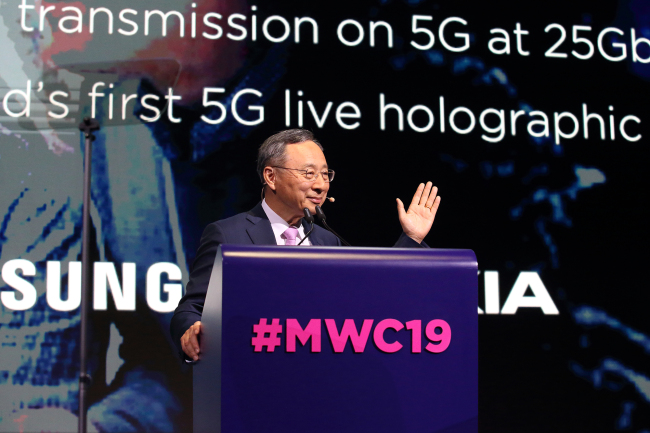BARCELONA, Spain -- The head of South Korea’s major mobile carrier said Monday that the country’s business sectors will be the first to see the benefits of the fifth-generation network when its commercial service kicks off this March.
During his opening speech for Mobile World Congress 2019 in Barcelona, KT Chairman Hwang Chang-gyu said the long-anticipated 5G technology will be applied to an extensive range of business areas -- from high-tech smart factories to traffic networks for autonomous driving.
 |
KT chief Hwang Chang-gyu delivers the keynote speech at the opening ceremony for Mobile World Congress 2019 in Barcelona on Monday. (KT) |
His remarks come as Korea gears up for the commercial rollout of its 5G networks this March, when the next generation of smartphones hits the market. Phone manufacturers had already unveiled the first 5G-powered smartphones before MWC 2019 officially kicked off on Monday.
“KT is introducing true 5G mobile services for the first time in the world,” Hwang said during his keynote speech at Fira Gran Via, where business leaders around the world have gathered for MWC 2019.
“The 5G’s massive connectivity will ensure distribution of benefits from the fourth industrial revolution to all industries and all individuals fairly and economically.”
While 5G networks are expected to be rolled out for public use next month in Korea and soon afterward in other countries, companies around the world are struggling to figure out how the advanced system can best be used to improve people’s everyday lives.
Hwang said a business-to-business model was the place where people could best appreciate the benefits of 5G networks for now. Analysts have predicted that the 5G service will run at least 10 times faster than the current 4G LTE service.
Among the places where those benefits will be most apparent are “smart factories” powered by hyper-speed networks with low latency, Hwang said. He pointed to 5G-powered shipyards as an example of how the advanced networks could maximize efficiency in the construction process and improve worker safety.
“Just imagine how they managed to do all these manually and over the fixed lines,” Hwang said as he showed the crowd a clip of manufacturing workers engaging in their daily tasks at what KT described as the world’s first 5G-powered shipyard.
Hwang also expressed hopes that KT would lead the efforts to make autonomous driving a reality via 5G networks. During the 2018 PyeongChang Winter Olympics, the company introduced a self-driving bus for tourists on a trial basis.
Besides autonomous driving, Hwang said, 5G can improve traffic systems by allowing a network to control vehicles in an emergency.
In December, the company showcased a 5G-based vehicle control system in a mock self-driving city in Hwaseong, Gyeonggi Province. Vehicles shifted to autonomous driving mode to rescue drivers when the orders came in.
“With vehicle to everything, KT redefines 5G as a life-saving technology,” Hwang said.
By Korea Herald correspondent Yeo Jun-suk (
jasonyeo@heraldcorp.com)




![[Today’s K-pop] Blackpink’s Jennie, Lisa invited to Coachella as solo acts](http://res.heraldm.com/phpwas/restmb_idxmake.php?idx=644&simg=/content/image/2024/11/21/20241121050099_0.jpg)



